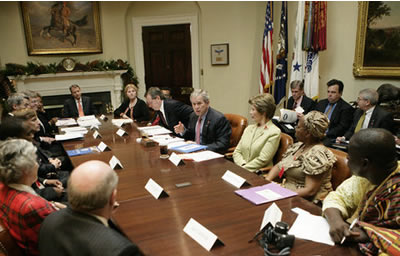-
(单词翻译:双击或拖选)
THE PRESIDENT: Good morning. I returned home this week from a visit to the Middle East. On my trip, I met with Prime Minister Maliki of Iraq to discuss how we can improve the situation on the ground in his country and help the Iraqis build a lasting1 democracy.
My meeting with Prime Minister Maliki was our third since he took office six months ago. With each meeting, I'm coming to know him better, and I'm becoming more impressed by his desire to make the difficult choices that will put his country on a better path. During our meeting, I told the Prime Minister that America is ready to make changes to better support the unity2 government of Iraq, and that several key principles will guide our efforts.
 |
|
|
Second, the success of the Iraqi government depends on the success of the Iraqi security forces. The training of Iraqi security forces has been steady, yet we both agreed that we need to do more, and we need to do it faster. The Prime Minister wants to show the people who elected him that he's willing to make the hard decisions necessary to provide security.
To do that, he needs larger and more capable Iraqi forces under his control, and he needs them quickly. By helping4 Iraq's elected leaders get the Iraqi forces they need, we will help Iraq's democratic government become more effective in fighting the terrorists and other violent extremists, and in providing security and stability, particularly in Baghdad.
Third, success in Iraq requires strong institutions that will stand the test of time and hardship. Our goal in Iraq is to help Prime Minister Maliki build a country that is united, where the rule of law prevails and the rights of minorities are respected. The Prime Minister made clear that splitting his country into parts is not what the Iraqi people want and that any partition of Iraq would lead to an increase in sectarian violence.
Security in Iraq requires sustained action by the Iraqi security forces, yet in the long term, security in Iraq hinges on reconciliation5 among Iraq's different ethnic6 and religious communities. And the Prime Minister has committed his government to achieving that goal.
The Prime Minister and I also discussed the review of America's strategy in Iraq that is now nearing completion. As part of this review, I've asked our military leaders in the Pentagon and those on the ground in Iraq to provide their recommendations on the best way forward.
A bipartisan panel, led by former Secretary of State James Baker7 and former Congressman8 Lee Hamilton, is also conducting a review. And I look forward to receiving their report next week. I want to hear all advice before I make any decisions about adjustments to our strategy in Iraq.
I recognize that the recent violence in Iraq has been unsettling. Many people in our country are wondering about the way forward. The work ahead will not be easy, yet by helping Prime Minister Maliki strengthen Iraq's democratic institutions and promote national reconciliation, our military leaders and diplomats9 can help put Iraq on a solid path to liberty and democracy. The decisions we make in Iraq will be felt across the broader Middle East.
Failure in Iraq would embolden10 the extremists who hate America and want nothing more than to see our demise11. It would strengthen the hand of those who are seeking to undermine young democracies across the region and give the extremists an open field to overthrow12 moderate governments, take control of countries, impose their rule on millions, and threaten the American people. Our Nation must not allow this to happen.
Success in Iraq will require leaders in Washington -- Republicans and Democrats13 alike -- to come together and find greater consensus14 on the best path forward. So I will work with leaders in both parties to achieve this goal. Together we can help Iraqis build a free and democratic nation in the heart of the Middle East, strengthen moderates and reformers across the region who are working for peace, and leave our children and grandchildren a more secure and hopeful world.
Thank you for listening.
 收听单词发音
收听单词发音
1
lasting

|
|
| adj.永久的,永恒的;vbl.持续,维持 | |
参考例句: |
|
|
|
2
unity

|
|
| n.团结,联合,统一;和睦,协调 | |
参考例句: |
|
|
|
3
ballots

|
|
| n.投票表决( ballot的名词复数 );选举;选票;投票总数v.(使)投票表决( ballot的第三人称单数 ) | |
参考例句: |
|
|
|
4
helping

|
|
| n.食物的一份&adj.帮助人的,辅助的 | |
参考例句: |
|
|
|
5
reconciliation

|
|
| n.和解,和谐,一致 | |
参考例句: |
|
|
|
6
ethnic

|
|
| adj.人种的,种族的,异教徒的 | |
参考例句: |
|
|
|
7
baker

|
|
| n.面包师 | |
参考例句: |
|
|
|
8
Congressman

|
|
| n.(美)国会议员 | |
参考例句: |
|
|
|
9
diplomats

|
|
| n.外交官( diplomat的名词复数 );有手腕的人,善于交际的人 | |
参考例句: |
|
|
|
10
embolden

|
|
| v.给…壮胆,鼓励 | |
参考例句: |
|
|
|
11
demise

|
|
| n.死亡;v.让渡,遗赠,转让 | |
参考例句: |
|
|
|
12
overthrow

|
|
| v.推翻,打倒,颠覆;n.推翻,瓦解,颠覆 | |
参考例句: |
|
|
|
13
democrats

|
|
| n.民主主义者,民主人士( democrat的名词复数 ) | |
参考例句: |
|
|
|
14
consensus

|
|
| n.(意见等的)一致,一致同意,共识 | |
参考例句: |
|
|
|

















